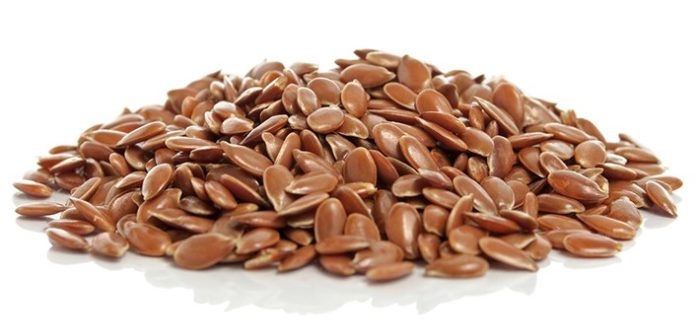Can flaxseed be the new ‘superfood’ in town??
Well, certainly ‘Yes’ as a number of essential nutrients are packed in its tiny brown or golden seeds. Flaxseed has recently come into the limelight as a rich source of healthy omega-3 fatty acids, lignans, and dietary fiber. It is also a good source of manganese, magnesium, thiamine (Vitamin B1) and selenium. When combined with Vitamin E, selenium works as an antioxidant, guarding our bodies against the malicious free radicals.
Consuming flaxseed in moderate quantity can help you in maintaining a healthy gut, smoother skin and protect you against life-threatening heart diseases and cancers. A lot of nutrition experts recommend consuming ground flax seeds as they are easily digested by your body. The nutty-flavored seeds can be ground and added to your bread, cereals or salads to meet your daily dietary needs.
Here are some of the top health benefits of flaxseed:
- Aids in Digestion
Since flaxseed is a rich source of dietary fiber, consuming it as a part of your diet will ensure smooth bowel movements and a healthy colon. The daily recommended intake of dietary fiber is 38 gm for men and 25 gm for women. Flaxseed can provide 27 gm of fiber per 100 grams consumed.
The oil content in flaxseeds also aids in lubricating the digestive system and cures constipation. The omega-3 fatty acids help in reducing inflammation of the digestive tract in Crohn’s disease and other inflammatory bowel diseases.
- Prevents Heart Diseases
Flaxseeds are a rich source of omega-3 in the form of alpha-linolenic acid, commonly referred to as ALA. The ALAs help in reducing inflammation, controlling irregular heartbeats (arrhythmia) and reducing high blood pressure.
In addition to this, the high fiber content also helps in lowering LDL (bad cholesterol) by restricting the absorption of cholesterols in your body. Lower cholesterol levels, in turn, reduce chances of blocked arteries that can cause a stroke or heart attack. According to a study published in 2002 in the Journal of Women’s Health, regular consumption of flaxseed helped in reducing the LDL and overall cholesterol levels in postmenopausal women native to America.
- Prevents Cancer
Flaxseeds are the richest source of lignans, an antioxidant that is believed to prevent colon, prostate, ovarian and breast cancer. The omega-3 fatty acids prevent the tumor cells from destroying the healthy cells of your body. The lignans, on the other hand, starve the tumor cells from oxygen and other nutrients, thereby mitigating their multiplication.
A cancer research published in 2005, by the American Association of Cancer Research, stated that daily consumption of 25 gm of flaxseed helped in reducing the tumor growth in premenopausal women newly diagnosed with breast cancer.
4. Lowers Blood Sugar Levels
Diabetes is a major cause of several ailments like heart attacks, kidney failure, and blindness. According to the American Diabetes Association, almost 9.3% of American population suffered from diabetes in 2012. The lignans in flaxseeds help in decreasing your insulin resistance and control blood sugar levels.
According to a study published in 2007 in an online journal ‘Plos One’, daily consumption of flaxseed-derived lignans had significant impacts on controlling blood sugar levels in Type 2 diabetes patients.
- Helps in weight loss
The fiber-rich flaxseeds help in keeping hunger and cravings at bay. Consuming a high-fiber diet means you stay full for longer periods and consume lesser calories.
Flaxseed can be easily included in your low-calorie diet as 1 tbsp of flaxseed has around 37 calories. Also, the omega-3 fatty acids in flaxseed help in increasing the secretion of adiponectin, a hormone that helps break down glucose in your body to be used for energy.
To help you start, here are some of the easy ways of introducing flaxseed into your diet –
- In salads – You can give your salads an extra crunch by adding a tbsp of flax seeds.
- Bread and muffins – You can grind the seeds and mix them in the dough for making your favorite muffins or puddings.
- Smoothies – You can soak some seeds overnight and blend them into your breakfast smoothies for extra fiber.
- In place of eggs – 2 tbsp of flaxseed can be used in place of 1 egg in any recipe that requires egg.
- With yogurt or oatmeal – You can mix ground flaxseed with your low fat yogurt for breakfast. It also gels well with oatmeal owing to its nutty flavor.
Readers Also Liked:
 9 Life Hacks To Gain From Starting A Yoga Practice
9 Life Hacks To Gain From Starting A Yoga Practice
Loving The Body You’re In, No Matter What Your Size
Make The Most Out Of Your Workout In The New Year With These Tips

